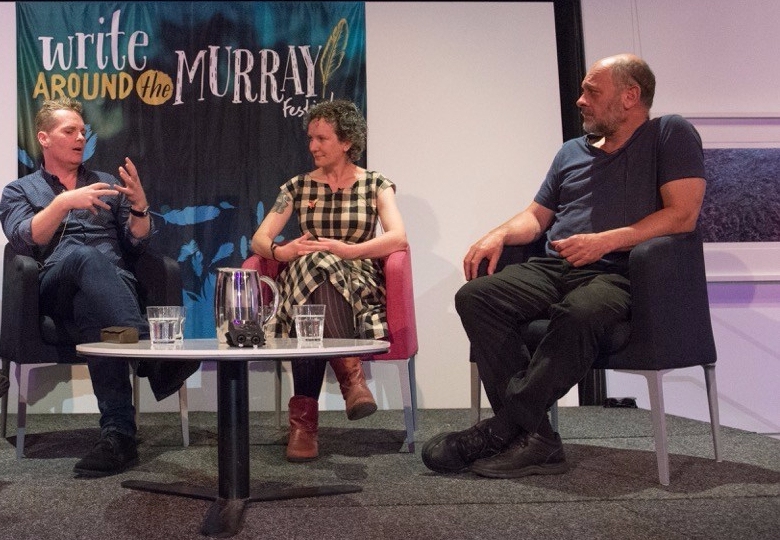
Some interesting tweets and comments this week from recent Australia writters conference with Cat Sparks, James Bradley and many more at the New South Wales Writers Center conference....
''hat tip'' to Australian Twitterer Adeline Teoh:
TWEETS BELOW:
Adeline Teoh (张美鍊) @witmol
"Sci-fi is about technology, cli-fi is about fixing economics" - said James Bradley at @cityoftongues #nswwc
Adeline Teoh (张美鍊) @witmol
"All sci-fi will be cli-fi" - said Cat Sparks at @catsparx #nswwc
Adeline Teoh (张美鍊) (@witmol) also tweeted at 5:45 PM on Sat, Jul 22, 2017:
"Sci-fi has done a shit job at saving the future. Genre taint scuttled it" - @catsparx #nswwc
(https://twitter.com/witmol/
"People just haven't realised that we're all writing anthropocene fiction" - said James Bradley @cityoftongues #nswwc
"Post-apocalyptic fiction is a kind of contempt pornography... but I still like it." - said @catsparx #nswwc
"Sci-fi has done a shit job at saving the future. Genre taint scuttled it" - @catsparx #nswwc
(https://twitter.com/witmol/
"People just haven't realised that we're all writing anthropocene fiction" - said James Bradley @cityoftongues #nswwc
"Post-apocalyptic fiction is a kind of contempt pornography... but I still like it." - said @catsparx #nswwc
================================
JANE RAWSON NOTES:
I am in Sydney, I’m on at NSW Speculative Fiction Festival. I’m chairing a panel on
‘The Future we Deserve: From sci fi to cli fi’,
featuring Daniel Findlay, Cat Sparks and James Bradley, and festival runs all day on 22 July at the NSW Writers’ Centre in Rozelle.

============================================
POST SCRIPT:
If you've ever flown into Sydney, Australia from overseas at night while looking out the window of your 747, you might this Australian pop folksong titled "Have You Ever Seen Sydney From a 747 at Night?"
It's an infectious little tune sung by a some tall Australians, and since this blog post is about the rise of a new literary genre dubbed ''cli-fi'' in Australia, I thought this might be a nice musical way of getting into the mood.
Recently the New South Wales Writers Centre in Australia set up a winter writer's conference and featured a panel titled "From Sci-fi to Cli-Fi: the Future We Deserve." Some interesting Twitter tweets and comments from noted novelists and literary critics Cat Sparks and James Bradley added some nice sparks to the conference.
Freelance writer and magazine editor Adeline Teoh attended the conference and took notes by hand in her notebook during the panel discussion, she said, and later put some of the comments by Bradley and Sparks on her Twitter feed. The tone and grace of the comments by the two novelists was wonderful to behold, and what they offered was food for thought.
''Sci-fi is about technology, cli-fi is about fixing economics," Bradley, the author of the cli-fi novel "Clade," said on the panel. That is an interesting concept and deserves some more discussion and amplification (and clarification) later on, and not just in Australia but in other literary circles around the world, from Canada to Berlin. New York and San Francisco, too.
Cat Sparks, author of the cli-fi novel "Lotus Blue," really surprised when she told the conference during her turn on the panel: "All sci-fi will be cli-fi" [in the future].
Both comment by Bradley and Sparks were explosive and no doubt sparked more conversations in the local pubs after the event concluded. How their remarks will be seen and reported overseas in London and New York will be interesting to see. I loved what they said, and as I said above, it is good food for thought.
Sparks, who is doing a PhD thesis on sci-fi and cli-fi, also said: "Sci-fi has done a shite job at saving the future. Genre taint scuttled it."
There were more comments from the stage.
"People just haven't realized that we're all writing anthropocene fiction," Bradley told the audience.
And Sparks noted: "Post-apocalyptic fiction is a kind of contempt pornography... but I still like it."
So there you have it. A well-attended literary conference in Australia featured a post-modern panel discussing post-modern literary theory, and the result was explosive and eye-opening. How sci-fi novelists and literary critics (and cli-fi novelists and literary critics) will react to the comments heard on the panel is anyone's guess. But time will tell.
Cli-fi marches on.
And Sparks noted: "Post-apocalyptic fiction is a kind of contempt pornography... but I still like it."
So there you have it. A well-attended literary conference in Australia featured a post-modern panel discussing post-modern literary theory, and the result was explosive and eye-opening. How sci-fi novelists and literary critics (and cli-fi novelists and literary critics) will react to the comments heard on the panel is anyone's guess. But time will tell.
Cli-fi marches on.
No comments:
Post a Comment